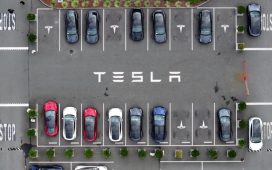Pratt criticized such waffling ambitions as happy talk.
“What has to change is that we have to mature a little bit, and we have to stop doing wishful thinking,” he said. “A real discussion is that these are the constraints in the development of resources in the world, both material resources and charging infrastructure and renewable power… If that is true, how do we reduce the total amount of carbon dioxide that will accumulate?
“That is a mature discussion, not a kind of dream discussion.”
Toyota draws from several forecasts that show battery demand for lithium continuing to outstrip supply of lithium as far into the future as 2040. One scenario shows supply covering as little as one-third of total global demand in that time frame.
The reason is that it takes only two or three years to open a new battery factory, but up to 16 years to dig a new mine. “There’s going to be a delay in getting all the mining set up,” Pratt said.
The pinch isn’t limited to lithium.
Industry research shows a host of other metals needed for batteries are also falling into short supply, including nickel and manganese, Pratt said. Aside from crimping the supply of EVs, these material shortages will also likely push up battery costs. And higher sticker prices, in turn, will likely tamp down consumer demand for EVs, he predicted.
“We somehow have to lower carbon dioxide emissions as much as possible, as soon as possible, even though there is a tremendous shortage,” Pratt said, “and we’ll continue to have a tremendous shortage in battery materials. As you can imagine, it’s a big challenge.”
Pratt said he was inspired to delve into the battery question by his family’s experience owning a Tesla Model X. The vehicle has an impressive 300-mile range. But his wife typically drives it less than 30 miles a day. That means 90 percent of the lithium ion battery is dead weight, he noted.
“It’s an incredible waste of materials,” Toyota’s chief scientist said.
“I think what’s needed is a little bit more frankness from the OEMs, both to the public and also to policy makers.”







